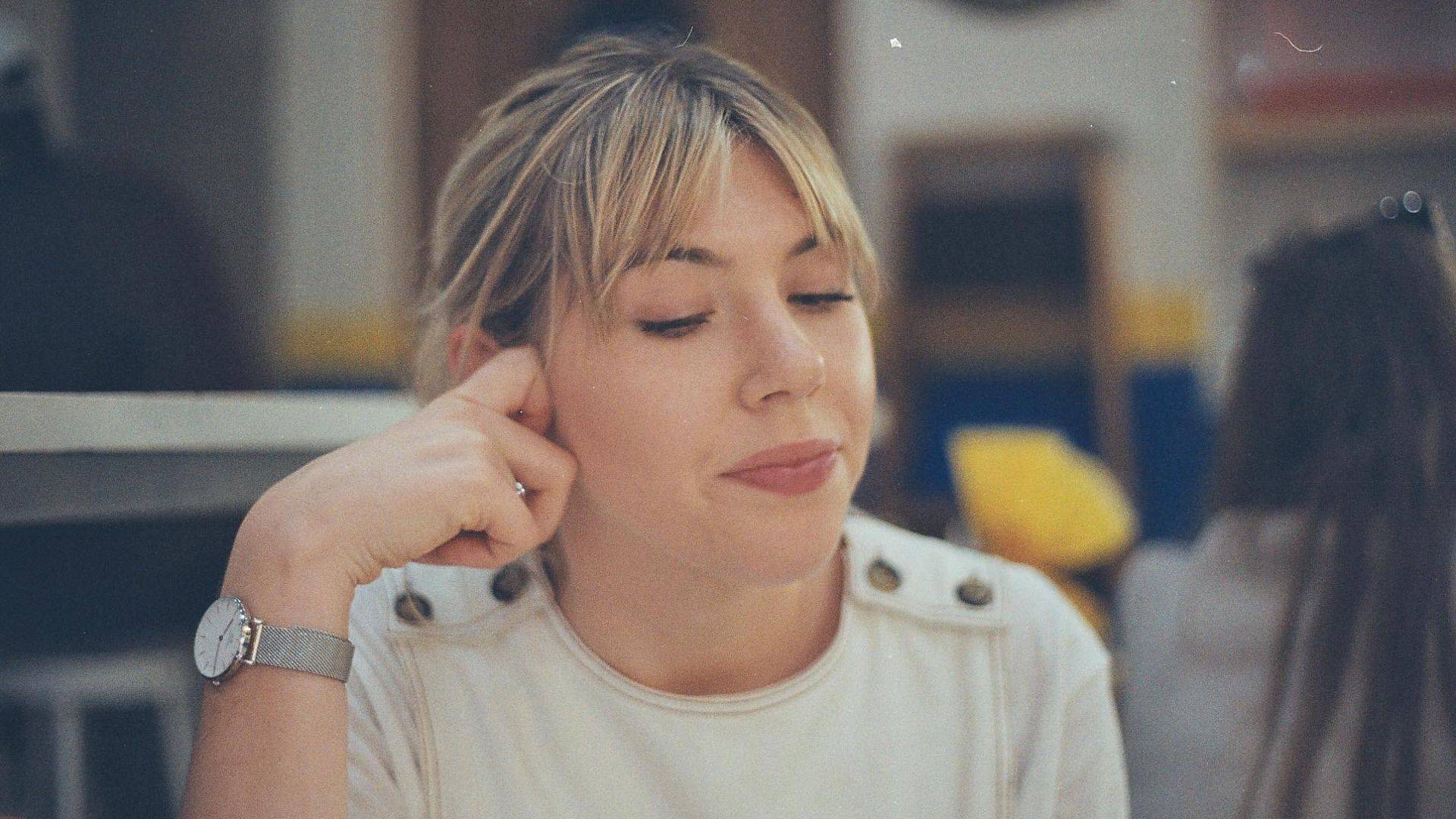Spacey Jane Are Not OK, And That’s Fine By Them

My most recent memory of live music was a packed-out concert that took place at Newcastle’s illustrious Civic Theatre. It’s a hallowed venue that usually houses the traditional bourgeois of classic stage shows, or the volcanic laughter of stand-up sets. Musicians sometimes take to the stage – but they’re all musicians you can enjoy, reclined, with a nice glass of red.
Not exactly the best way to describe or enjoy Spacey Jane.
Four young WA pals making instantly charismatic indie rock is much more befitting to a rowdy sunset festival mosh, with the crowd being sprinkled with the charming yet foul aroma of overpriced, mid-strength beer. But, in early April, NSW was successfully coming out of one mild outbreak yet unaware of the worst of the pandemic we’d seen so far just weeks beyond. Restrictions still existed – so Spacey Jane made do, and gave Civic Theatre the most raucous show it’d seen in years. I’m not a religious person, but that night felt like church – watching so many people stare with complete adoration at a band who still feel like they’re just doing this for fun.
That’s an energy that is driven largely by the band’s frontman, Caleb Harper. “Obviously, it's hard to feel amazing every day that you're on tour, for every show,” Harper tells MTV Australia.
“Sometimes you've got other shit going on, or you're hungover, or you're tired. There could be a million reasons. The way that I feel when I step out and what people give back to me will always turn me around, and always feels like a privilege, and is always surreal. I hope I don't get used to it.”
Spacey Jane’s success over the past two years has been almost unbelievable to witness, especially in a country that uses festivals as a primary way to foster talent. Despite limited festivals, Spacey Jane’s debut album Sunlight peaked at #2 on the ARIA charts and hit #1 on the triple j listeners’ album poll. The album spawned a string of singles, a huge chunk of which notched in triple j’s Hottest 100. But, their breakout hit “Booster Seat” defied all odds, beating out Flume, Cardi B and Tame Impala for second place in the revered countdown, just being edged out by Glass Animals’ unstoppable “Heat Waves”.
But there’s no rest for the wicked, and the band – also consisting of guitarist Ashton Hardman-Le Cornu, bassist Peppa Lane and drummer Kieran Lama – have continued building their momentum. They released “Lots Of Nothing” earlier this year, and this week have backed it up with “Lunchtime” – another new taste of the band’s second album which is due out in the first half of 2022.
Musically speaking, “Lunchtime” could be considered standard Spacey Jane fodder – sunny guitars coupled with Harper’s singular, gritty vocals. On a closer listen, though, the track plays into something only keen-eared fans would pick up – using bright melodies as a backdrop for more bleak lyrics. This isn’t a completely foreign concept for the band, but the lyrics in “Lunchtime” deals in subtleties in ways lots of bands fail to.
“She looks like she means it/I'm not feeling confident this time/Dripping tears on pillows/And an overwhelming sense of ‘fuck this’”
Harper says that while the juxtaposition between bright and dark is innately interesting, it also is a way to make his life easier.
“Part of the whole thing on stage is that there's varying degrees to which you're performing and to which you're actually being yourself. I think that the sort of stuff that I write about is very vulnerable and personal – in the moment I'm talking about it – but I think it would do my head in if I had to relive those moments every time onstage.
“I think the musicality in something is the way I think about that. That's the way I'm trying to connect to people in a live context, I suppose. You want people to feel the music, not just think about the lyrics.”
“I think about delivering that as opposed to pouring my heart out when I'm onstage. People focus on lyrics when they're listening by themselves, if they're in a certain moment, driving past a certain place. That's when the lyrics reach out to someone. But when you go to a show, it doesn't matter what the words are. It could be gobbledegook, but you will put your hands up and sing along to it. It doesn't really matter that you don’t understand it, it's just that feeling you get.”
“[Songwriting is] like problem solving, in a sense,” he says. “You also don't want to go with the first idea for a verse or melody that you come up with, because you can come up with an even better ones. But you don't want to keep coming up with new ones because it could end up in this maze of ideas that you can't get out of.”
Getting bogged down in your own creativity must be a common experience during the pandemic, when outside inspiration is limited to whatever’s in your 5km radius. Of course, in WA, Harper’s experience of COVID-19 lockdowns is far more minimal than those of us on the east coast, but it still impacted Harper’s songwriting – in a way he never predicted.
Speaking about the nationwide lockdown we were all thrust into in early 2020, Harper reflects, “The shock of the silence of it all, and the forced introspection, was not something I was ready for at all.”
“It was mixed in with a lot of anxiety. This was just before we were putting our first album out. We were like, ‘Man, when do we put it out? Is it still okay? Is live music dead forever?’ They were talking about vaccines taking two, three, four years to put together. That sort of anxiety was pretty intense. It forced some reflection, and it forced a lot of people, me included, to look at the plights of others.”
“I had a look at what my experience was like coming out of high school. Thinking about the young people in those situations – they’re going to uni online. They can't get a bar job. They can't get a van and travel the coast and they can't do the Euro trip and all this shit. They’re completely forbidden from fulfilling these Australian rites of passage.”
Those key experiences reach to the core of Spacey Jane’s demographic: young Australians with the world ahead of them. This is a demographic that Spacey Jane are themselves a part of, and the reflection Harper went through during those first months of the pandemic resulted in “unique experiences” that he believes he wouldn’t have had otherwise.
“In the end, so much life ended up happening because of COVID. So much weird stuff happened that I had to document, and I was in a unique position to be quite reflective in a way that I wouldn't have been if it weren't for that.”
Of course, that culminated itself in the band’s second album, which Harper says he’s still putting some final tweaks on. However, despite the time it was written and despite the reflection, it’s definitely not a ‘pandemic album’.
“It’s a lot more considered and intentional than Sunlight,” Harper says, “It’s cleaner, it’s bolder, but the guitar work is far less in your face. ‘Lunchtime’ is the outlier there.”
“I wanted it to be less introspective in terms of talking about things that I personally have been through, and talk more about this feeling I’d picked up on – something that I've felt for ages but I could never put eloquently: this idea that you're supposed to be really fucking happy all the time in your early 20s, and it's the time of your life.
“People are just always telling you that, ‘You've got it so good. Look at me. I've got a mortgage and four kids. I'm miserable’,” he continues.
“The idea that if you are upset, if you do have a rough time at this age, if you do feel depressed, if you don't know what you want to do with your life, if you're a complete mess – it's difficult sometimes to have that moment to feel those things because people keep telling you that you're so lucky and everything should be great.
“I think there's this process of trying to tell people that. I want people to listen to it and be like, ‘Man. I feel like I shit and that's OK’.”
Harper exhibits a type of emotional intelligence, and willingness to be vulnerable, that pushes against the hypermasculine narrative that rears its ugly head every so often in Australia. Just this week, the music community has been left aghast by Melbourne newcomers Rancid Eddie, with many finding their lyrical content misogynistic and aggressive. Harper himself scoffs at the mention of the band.
Harper represents a different type of masculinity in his performance. He’s not afraid to cry, he’s not afraid to pour his heart out and he’s not afraid to admit when he fucks up. Aggression doesn’t appear to be in Harper’s wheelhouse, but passion certainly does.
“Sometimes it's like a fucking curse when it comes to mental health, because you're always assessing yourself and your impact on people. The thing that can actually make it quite easy is that I feel very supported and loved, but still held responsible for things I do. That's not just my band and my friends and the team around us, but also our fans are just amazing.”
“They just really get it, I think. They fully get what I'm trying to say and do and relate to it, and they thank me for that sort of outpouring and that emotional sensitivity. That's something I'm very blessed to have. I feel like I have this massive emotional support group around me.”
Apart from seeing a doctor and getting the therapy he needs, Harper’s biggest saving grace in addressing his own mental health issues came with stopping the urge to resist his emotions. He describes his performance style as “all-or-nothing” and all about throwing caution to the wind and letting himself just be.
“One of the worst things that people experience in mental illness, in my opinion, is that they think that they shouldn't be like that. Not only are they battling mental illness, they're also battling themselves on it.”
“You feel like shit in your own skin because you're fighting this version of yourself you think shouldn't exist.”
He continues, “There's many beautiful things that can come out of not fighting it. When you work through it and embrace it, you find things out about yourself.”
“When you talk to other people about it, you can connect with people and relate to people through it. There is still something in there, you can still live your life and things can still be good. It doesn't have to consume you.”
Caleb Harper represents an ethos that Spacey Jane have perhaps inadvertently forged for themselves – they want to be your comfort. For a band to have blown up around the nation at a time devoid of live music, they now endeavor to be the sunlight through the storm, the lunchtime bell at the end of class, a vaccine against what plagues us.
But their music, “Lunchtime” included, also recognises that there’s no point in resisting your own negativity. There’s ways to overcome our sadness without occasionally succumbing to it.
Or, as Harper so heartenly consoles, “You don't have to fight it.”
Words by Jackson Langford, senior music and culture writer at MTV Australia. Hot takes at @jacksonlangford and hotter pics at @jacksonlangford.





